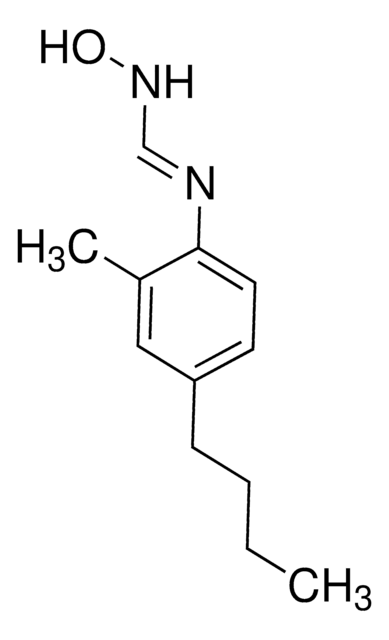H3023
20-Hydroxy-(5Z,8Z,11Z,14Z)-eicosatetraenoic acid
≥90% (HPLC), liquid, Ras/MAP pathway activitor
Synonym(s):
20-HETE, 20-Hydroxyarachidonic acid
About This Item
Recommended Products
product name
20-Hydroxy-(5Z,8Z,11Z,14Z)-eicosatetraenoic acid, ~100 μg/mL in ethanol, ≥90% (HPLC)
Assay
≥90% (HPLC)
form
liquid
concentration
~100 μg/mL in ethanol
shipped in
dry ice
storage temp.
−20°C
SMILES string
OCCCCC\C=C/C\C=C/C\C=C/C\C=C/CCCC(O)=O
InChI
1S/C20H32O3/c21-19-17-15-13-11-9-7-5-3-1-2-4-6-8-10-12-14-16-18-20(22)23/h1,3-4,6-7,9-10,12,21H,2,5,8,11,13-19H2,(H,22,23)/b3-1-,6-4-,9-7-,12-10-
InChI key
NNDIXBJHNLFJJP-DTLRTWKJSA-N
Biochem/physiol Actions
Packaging
Signal Word
Danger
Hazard Statements
Precautionary Statements
Hazard Classifications
Eye Irrit. 2 - Flam. Liq. 2
Storage Class Code
3 - Flammable liquids
WGK
WGK 1
Flash Point(F)
57.2 °F - closed cup
Flash Point(C)
14.0 °C - closed cup
Personal Protective Equipment
Certificates of Analysis (COA)
Search for Certificates of Analysis (COA) by entering the products Lot/Batch Number. Lot and Batch Numbers can be found on a product’s label following the words ‘Lot’ or ‘Batch’.
Already Own This Product?
Find documentation for the products that you have recently purchased in the Document Library.
Customers Also Viewed
Our team of scientists has experience in all areas of research including Life Science, Material Science, Chemical Synthesis, Chromatography, Analytical and many others.
Contact Technical Service














